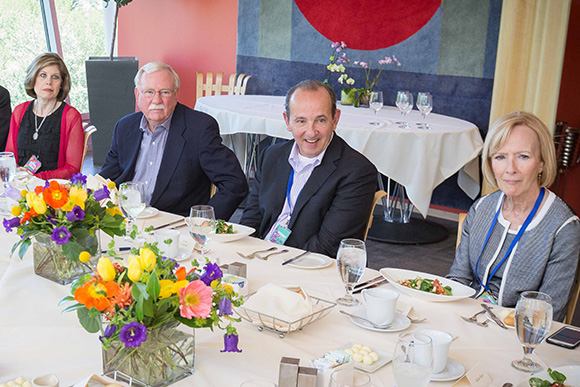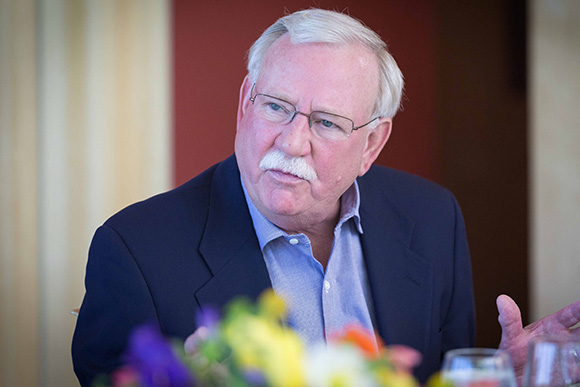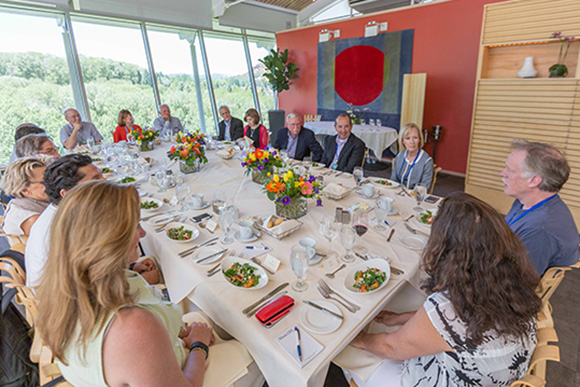
Dennis Roop, PhD, director of the Gates Center for Regenerative Medicine at the CU Anschutz Medical Campus (second from left), was the featured guest at the Atlantic magazine luncheon. Other guests included, from left, Nancy Brown, CEO of the American Heart Association; Kevin Vigilante, senior vice president and chief medical officer of Booz Allen Hamilton; and Judy Woodruff, co-anchor and managing editor of the PBS Newshour. Photos by Matt Kaskavitch, University Communications.
By Chris Casey | University Communications
ASPEN, Colo. – The conversation delved into induced pluripotent stem cells (IPSCs), viral vectors, cytoplasm and other high science. But at the heart of a roundtable on regenerative medicine was the ground-breaking research taking place at the new Gates Biomanufacturing Facility (GBF) on the CU Anschutz Medical Campus.
CU Anschutz’s Dennis Roop, PhD, was the featured guest at a June 27 Spotlight Health-Aspen Ideas Festival luncheon that included 20 of the nation’s top leaders in health care as well as journalists Judy Woodruff, co-anchor of the PBS Newshour, and Corby Kummer, senior editor of The Atlantic magazine.
Testament to the influence and leadership of the CU Anschutz Medical Campus, the gathering sought out the insights of Roop, who was recruited from Baylor College of Medicine in 2007 to be director of the Gates Center for Regenerative Medicine.
The 14,000-square-foot GBF, which operates as a cost-neutral auxiliary service center of the CU School of Medicine, opened this spring and is located in the Bioscience Park Center. As Roop has noted, the proximity of the GBF to the CU Anschutz Medical Campus is a huge benefit, as scientists and clinicians are now able to walk across the street, manufacture their product, and walk it back to the hospitals for clinical use.

Dennis Roop, PhD, director of the Gates Center for Regenerative Medicine at the CU Anschutz Medical Campus, was the featured guest at the Atlantic magazine luncheon.
The facility has been called a “game-changer” for the CU Anschutz Medical Campus, as well as Colorado. It is expected to help develop patient treatments faster, allowing researchers to fully develop ideas from bench to bedside.
'Ultimate precision medicine'
Roop told the gathering that there are only six facilities in the nation with the capacity to both grow patient cells and produce protein-based products. “We’re the only one within an 800-mile radius of Denver,” he said. “It’s the ultimate in precision medicine.”
The facility has a vision for breakthroughs, Roop said, and currently involves a consortium of 76 member researchers representing CU Anschutz Medical Campus, CU Boulder, National Jewish Health, Colorado State University, Colorado School of Mines and private industry.
The GBF offers cell therapy and protein/biologics manufacturing rooms, along with cell and protein development laboratories. Overseen by expert staff, the facility offers process development and scale-up from bench to bedside, manufacturing of both cell therapy and protein-based products to Good Manufacturing Practice (GMP) standards, and thorough process documentation.
Much of the conversation at the June 27 luncheon focused on the science behind, and the bioethical issues around, stem cell regeneration. Fifteen years ago, President George W. Bush put restrictions on research on stem cells collected from embryos, arguing that the practice devalued human life.
Roop explained that using IPSCs –- adult stem cells -- removes that controversy, plus they offer a lower likelihood of rejection.
“(With IPSCs) not only does it get around the ethical and political issues of destroying an early fertilized human embryo to generate embryonic stem cells, but the IPS technology is better medicine because you actually take the biopsies from the same patient you want to treat,” Roop said. “We don’t know yet, but we think (in the future) we won’t have to worry about immune rejection and using immune-suppressant drugs.”
'Skin is a great target'
Roop hopes to translate his research of inherited skin fragility syndromes, or blistering skin disease, which can be fatal, into one of the first clinical-grade trials out of the GBF. "Skin is a great target because it's visible, you can monitor it, and there's currently no cure for these diseases," he said.

The Atlantic magazine luncheon at the Aspen Ideas Festival brought together about 20 of the nation's top leaders in health care as well as national journalists.
Other luncheon guests noted, and Roop acknowledged, how long it takes to get through the Food and Drug Administration’s rigorous clinical trial process.
Roop said skin blistering research holds promise to also help military veterans who suffer from chronic wounds. “We know they exhaust the ability of their skin’s stem cells to repair themselves,” he said. “So this (treatment), once you’ve shown it’s safe, could be used as a way to treat chronic wounds and avoid the lengthy hospital stays and medical bills.”
A luncheon member asked if the IPS technology has potential for regenerating organs throughout the body. It does, Roop said. “Scientists now have been able to differentiate these IPS cells into essentially every tissue type just like you can differentiate embryonic stem cells into different tissue types.”
Along with the IPSC technology are recent advancements that allow scientists to genetically correct defects in embryonic DNA, Roop said. “Genome editing has come along in parallel with this ability to reprogram adult cells.”
When discussion shifted into the challenges of securing funding for stem cell research, Nancy Brown, CEO of the American Heart Association, observed that it’s a subject that can be difficult to make salient for both policy makers and wider audiences. “Some of the advances are so sci-fi that they’re very hard to explain to the public,” she said.
Another luncheon guest commented that the politically sensitive topic of stem cells, regardless of whether they originate from adult or embryonic tissue, is likely to continue to generate pause among policy makers and grantors alike. “Just because embryonic cells have now been put to the side, it doesn’t mean that the ethical issues” go away, he said.
Later in the day on June 27, Roop held “Executive Office Hours” on The Aspen Institute campus about the work of the Gates Biomanufacturing Facility and the Gates Center for Regenerative Medicine.
He said he enjoyed having an audience with such a high-profile group of thinkers over lunch. “It was great to get feedback from them, especially concerning public perception and the bioethics aspect.”
Aspen Ideas Festival
The University of Colorado Anschutz Medical Campus was a presenting underwriter of the 2015 Aspen Ideas Festival’s three-day Spotlight Health series. Leading physicians and scholars from the CU Anschutz Medical Campus shared their insights and research with 1,000-plus attendees from June 25-28.
The high-profile Spotlight Health forum is an ideal platform on which to raise the profile of the CU Anschutz Medical Campus.
"The festival takes place in Aspen, our own backyard, and attracts attendees from around the country and the world," said Leanna Clark, vice chancellor of University Communications. "The Spotlight Health focus ensures that we are getting the Anschutz Medical Campus brand in front of the foremost academics, policy makers, practitioners, industry executives, philanthropists and concerned citizens, and engaging them in the conversation to transform health and health care.”
The Aspen Institute invited a group of "Spotlight Scholars" to attend the conference in recognition of their academic accomplishments and ability to translate ideas into action. Four scholars represented the CU Anschutz Medical Campus: Brandi Freeman, MD, assistant professor, Pediatrics-General Pediatrics; Jason Stoneback, MD, Department of Orthopedics; Roberta Capp, assistant professor, Emergency Medicine; and Christopher Porter, MD, assistant professor, Pediatrics-Hematology/Oncology.
Published June 30, 2015
Contact: Christopher.Casey@ucdenver.edu




